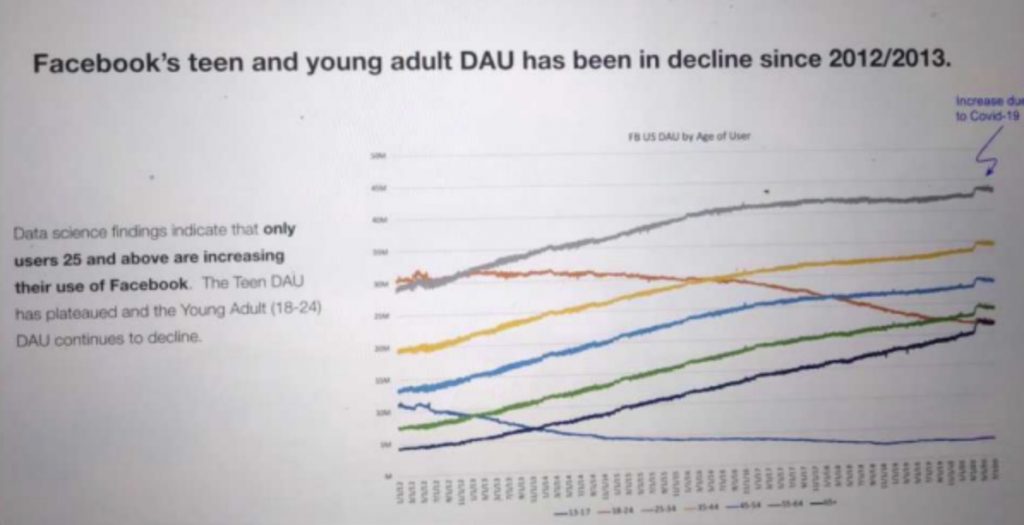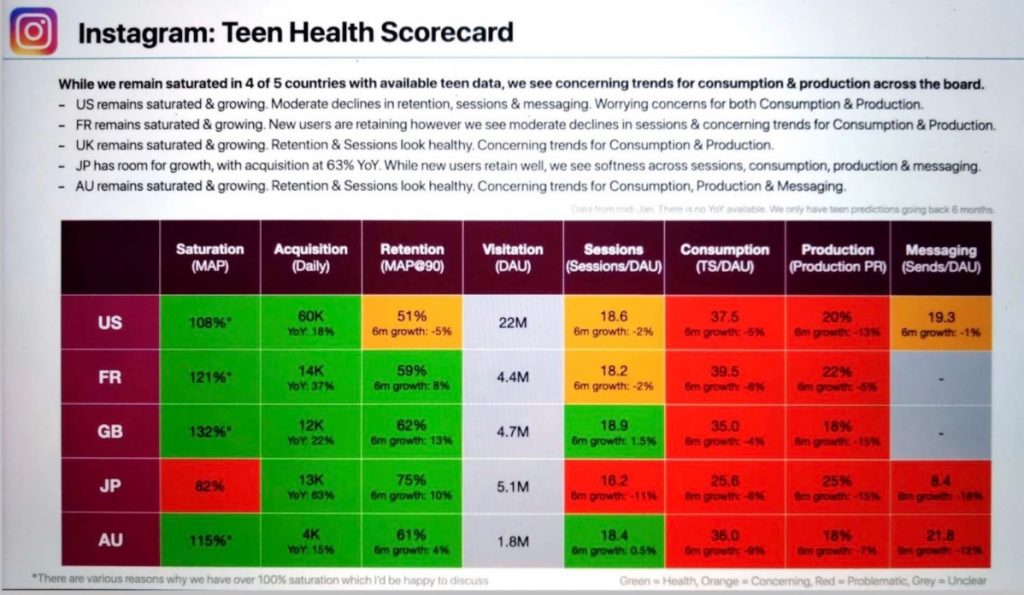The Facebook Papers show how Facebook’s relentlessly positive and defiant PR messaging is not plausible anymore. Hence, a rebrand.
It sounds too good to be true. Facebook is proud of how it fixes its problems. It invests billions. It has AI and now measures the “prevalence” of the bad stuff. It has no incentives not to give people what they want. It does this important work while feeling victimized by journalistic practice. They’re up against “cherry-picked” documents leaked in some coordinated fashion “to cast a negative light.” Critics just don’t understand the real Facebook.
For several years now, scholars and critics have been articulating (or, as is often the case, gesticulating) from the sidelines how companies such as Facebook (and Google) pose various threats to humanity and its civic orders. These allegations tend to hinge on how monopolistic digital business models yield externalities that impose net harms despite—and often because—of the significant general purpose and value they provide and extract. This view sharply contradicts Facebook’s standard rebuttal to critics, that its platforms provide a net benefit for the world despite any claimed harm. Company spokespeople consistently insist they are “proud” of their ongoing efforts to invest in redressing harms, doing “more.”
For many of Facebook’s influential critics in academia and advocacy groups, the professionally managed we-told-you-so whistleblowing of former Facebook product manager Frances Haugen, accompanied by her dossier of internal documents now commonly referred to as the Facebook Papers, affirms the core critique of Facebook’s many critics.
No detail so far exposed by Haugen’s accounts and evidence has surprised those of us already paying close attention with a critical eye. Facebook (and Google) have already concentrated far too much power. They are now routinely and officially accused of abusing their market dominance and the internal documents delivered by Haugen lay out some of the strategies and tactics expressed through the Facebook-Google platform duopoly mindset (and also revealed in parallel by an increasingly unredacted Attorneys General case against Google in Texas; see Jedi Blue). Now that the public enjoys a more expansive view into Facebook’s perspective of itself, the company’s public relations stance becomes increasingly preposterous. To believe the company now is to believe in something that is too good to be true. Do the Facebook Papers represent a company coming to grips with its own deceptions?
Taken together as a library collection, now being released more fully by Gizmodo but initially curated by The Wall Street Journal, the Facebook Papers paint a picture of a company that is in broad decline in key categories and knows it. Despite its resilient stock performance, the company grapples with a challenging near-term future. Various internal reports characterize the main app’s engagement metrics as becoming reliant on older and more right-wing users to sustain growth in the global North. Other examples show Facebook tailoring policy choices to favor these audience segments rather than advance any discernible principle.

Any downgrading of its audience quality for advertisers only incentivizes Facebook to further colonize the global South with minimal resourcing to make up for the loss. For example, internal documents indicate that 87 percent of Facebook’s misinformation classification budget is allocated to the US, concentrating resources on a mere 10 percent of the Facebook app’s daily users and leaving 13 percent of its budget for the rest of the world. After pouring through the Facebook Papers, it’s not that far-fetched to imagine Mark Zuckerberg being at a metaphorical control panel where he torques engagement and profit dials to optimize his machines. As key engagement demographics disengage with his services in North America and Europe, Zuckerberg dials integrity and safety spending at home despite seeing growth everywhere else.
However, the core Facebook app’s audience engagement shift toward older populations rather than the youth, to the right rather than the center, and toward “rest of world” rather than “all of world” has been an alarming problem for Mark Zuckerberg, one that Instagram was meant to solve. It’s hard to sympathize with him, though, because of his penchant for ignoring clear warnings that specify the dangers of his company’s growth tactics, like when he helped trigger the generalized privacy backlash against his own platform by allowing the Cambridge Analytica scandal to occur. Now Apple’s marketing of its products in direct opposition to Facebook, as a branded way to buy protection from Zuckerberg’s machinations, actually hinders quarterly growth quarter-over-quarter, per a recent earnings call. Facebook’s precision targeting doesn’t work as well without all the covert cross-app data tracking that most iPhone users are now blocking. Apple captures some new market share while Facebook is set to lose billions as a result of catering to supply and demand shifts toward privacy-safe digital advertising.
At Apple, we’ve always believed that you should be in control of your data — what you do with it & who you share it with should be up to you. App Tracking Transparency in iOS 14.5 gives you the choice to share the data that’s being collected about you across apps and websites. pic.twitter.com/EbfN8CtiKd
— Tim Cook (@tim_cook) April 27, 2021
Haugen’s vast trove of documents—photographed to evade detection (so not literally “papers”)—provide an unprecedented inventory of internal data and commentary from Facebook workers that describe intricate internal knowledge of how its products and services are contributing to genocide, authoritarianism, human servitude, vaccine skepticism, and a general undermining of democratic institutions and elections around the world. This partial litany of malfeasance and negligence forms a strong premise by which Haugen distributes proprietary information to the public and rebuts Facebook’s PR talking point that the information was “stolen.” It is excused. This is what whistleblowing sounds like.
A steady cadence of scandals since 2018 has only dinged Facebook’s stock price. Following each successive scandal, the stock reliably bounces back after investors confirm their own suspicions that the company will not be penalized in any meaningful way by governments or its true customers: legions of direct-to-consumer micro-advertisers. They can’t protest too much about the duopoly’s conduct, seeing as they are wholly dependent on these digital platforms to rent exclusive access to their customers over dodgy dashboards designed to satisfy their need for feeling like they are wasting less money on marketing costs. In one of her SEC complaints, Haugen alleges that Facebook “has misrepresented core metrics to investors and advertisers,” highlighting how the company obscures and manipulates declines in crucial target audiences by only reporting aggregate growth. She also draws attention to the company’s awareness of SUMA (Single User Multiple Accounts) and Finsta accounts (multiple Fake Instagram accounts managed by teens to hide their sharing from parents and authority figures). These and other distortions complicate Facebook’s offer of audience precision to advertisers which, after all these years, has turned out to be too good to be true.
At his grand rebranding on October 28, Zuckerberg starred in a demonstration of new virtual worlds in the works, an amusing distraction from the grim substance of the Facebook Papers. He literally became animated by a cartoonishly optimistic belief in manifesting his fantasy world that sounded too good to be true. Zuckerberg staged himself as the star of his next act in his shiny new Meta brand, turning his familiar and comforting game-like interface into the story of his own re-invention. Can we even blame him for wanting to move on from a wounded Facebook brand, especially now that so much of the company’s own privacy has been breached into public view by multiple rounds of whistleblowing?

From his board-proof and boycott-proof control center in Menlo Park, California, Zuckerberg has been studiously dialing-in how detailed design choices in algorithm modeling or user-experience elements have profound impacts at scale. He makes these far-reaching micromanaged tweaks that tend to involve either setting broad mandates for a metric (e.g., Meaningful Social Interactions, or MSI) or arbitrarily overruling an effective safety mechanic because it throttles a monetizing metric or risks political fallout.
Zuckerberg makes these kinds of calibrating and calculating decisions insulated from any injurious customer revolt (advertisers are trapped, boycotts mostly theatrical). With investors’ concerns allayed by Facebook’s soaring profits, the unitary executive is free to play with his machine and its effects on the world without the customary backstop of board reprisal when things go terribly wrong.
Instead, a singular leadership has been learning how to turn the control dials on the product that fills the feed troughs of billions and billions served. The company has also been developing an aptitude for obfuscating denominators on public data disclosures and stretching dashboards to torque audience engagement. This keeps the money machine going. Under their primary jurisdiction, the FTC and SEC notice the company’s deceptions. Settlements get negotiated down to the cost of doing business. Zuckerberg allegedly pays extra for opting out of a deposition.
This is all despite headwinds against the company as it loses a generation who already knows the promises of Facebook and Instagram sound too good to be true: that you can control your privacy (hello Finsta) and the experience on the platform is net beneficial for young people (getting recommended anorexia or conspiracy content within weeks). Stinging statements from a presentation in the Facebook Papers on teen attitudes about that platform include: “Most young adults perceive Facebook as a place for people in their 40s and 50s. Young adults perceive content as boring, misleading, and negative. They often have to get past irrelevant content to get to what matters. [And they] have a wide range of negative associations with Facebook including privacy concerns, impact to their wellbeing, along with low awareness of relevant services.”

As the Facebook Papers are coming into view like a jigsaw puzzle self-assembling, we can observe a pattern in which employees, having access to critical internal data and workstreams, precisely identify the platform’s harms only to have their efficacious solutions get quashed by executives. In this cycle of dysfunction, we see an increasingly defiant Zuckerberg turning the dials of his machine to overcompensate for observed declines in target audiences. As post-election chaos bubbled over in early January, the company flipped emergency switches including “break-glass” controls that activated measures designed to limit the spread of violent fomentations.
Unfortunately, our what-to-do-about-Facebook discourse is stuck in the same rut of the Cambridge Analytica debacle that broke open in 2018. In that regard, as far as whistleblowers go, Frances Haugen is probably the most favorable kind of whistleblower Zuckerberg could get. Even though she points blame at leadership, she does not invoke him by name. She also clearly prefers that Facebook remain a monopoly, a leviathan that only needs to be cleverly tamed but not by the FTC. (Haugen initially declined to send her files to Facebook’s key regulator, but is now cooperating with new FTC investigations.) When asked by policymakers what she would do, she extends Zuckerberg’s perspective that Facebook is “good” and filled with “good, kind, and conscientious” people. She wants the platform to thrive after asking it to declare “moral bankruptcy” and now calls for Zuckerberg’s resignation. According to Haugen, Facebook just needs to be regulated by enlightened veterans like her. Likewise, she calls for abusive algorithms to be dispensed in favor of old-fashioned chronology lists. Simplistic solutions to intrinsic problems of power and asymmetries solve the awkwardness of being both the professionalized whistleblower and de facto solutions consultant.
“A steady cadence of scandals since 2018 has only dinged Facebook’s stock price. Following each successive scandal, the stock reliably bounces back after investors confirm their own suspicions that the company will not be penalized in any meaningful way by governments or its true customers: legions of direct-to-consumer micro-advertisers.”
We have not achieved consensus on how to contend with a singular power like Zuckerberg’s. But before we devise the ultimate policy solution, we ought to address the stack of deceptions perpetrated by Zuckerberg and his company. This involves putting the rancorous debates about content moderation aside, for now. Let’s gather our collective critiques and focus first on punishing prior deceptions. It’s not acceptable for executives to get away with misleading lawmakers, and the public–investors and customers alike—through its spokespeople and on Capitol Hill. If this abuse of accountability goes unaddressed, it will only fester. Here’s a three-point plan to respond to the implications of the Facebook Papers.
- Punish prior deceptions, harshly. Assuming more recently-filed SEC and FTC complaints, as well as other pending lawsuits, will get to the bottom of specific allegations and potential recriminations; Congressional and journalistic inquiries should hammer on, holding official statements that amount to subterfuge to account.
- Inhibit the asymmetrical data exploitation, aggressively. We can resist treating the symptom of content moderation controversies and instead work to diagnose and cure the disease: the fundamental business model of monetizing attention with invasive personal data. The Facebook Papers remind us of this centrality to the business model.
- Observe the effects. Why tackle the fool’s errand of regulating protected speech when we could observe the reverberations that would emanate from punishing blatant data abuse and a culture of deception? Thanks to Apple, we can already see that protecting privacy makes it harder for Zuckerberg to dominate multiple markets. Might this culminate in bipartisan political will to enshrine data privacy and protection as a fundamental American right?
The odds are favorable that many of the downstream effects of Facebook’s business model and its unaccountable recklessness will be curtailed when otherwise-legalized deceptions are finally penalized. This also requires us to realize what Apple customers are actually requesting when they unambiguously decline total surveillance under Zuckerberg. When most users reject this cross-device tracking, they’re sending (by proxy) a different kind of signal to lawmakers in favor of muscular data protection, rights enablement, and enforcement to finally be conjured at the federal level, all this with a deep and abiding bipartisan political will of unusual focus.
Disclosure: David Carroll was a claimant against the Cambridge Analytica companies in the UK.
Learn more about our disclosure policy here.






